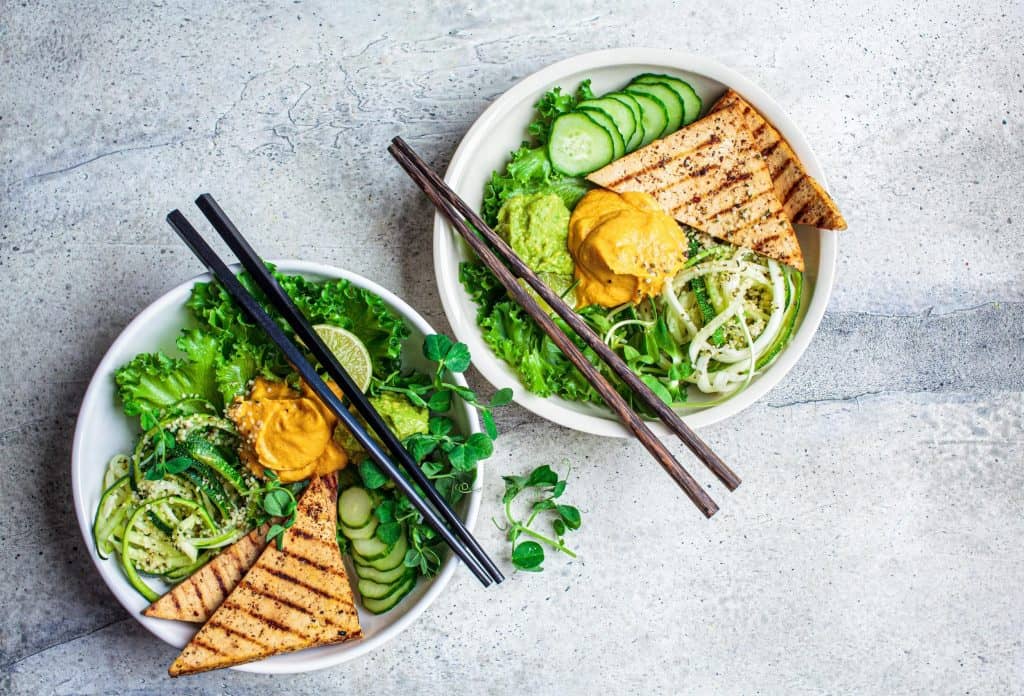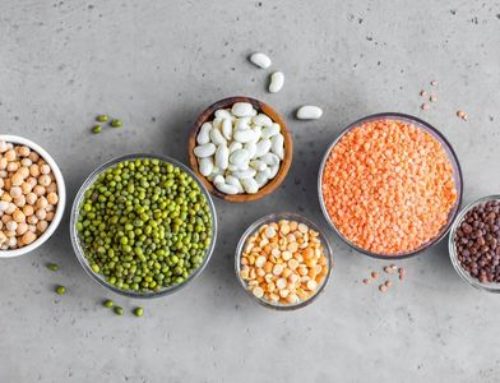
Many, if not all, vegetarians are asked this question: “Where do you get your protein?”
The good news is that a well-planned vegetarian diet can easily meet your protein needs!
The recommended daily intake (RDI) for protein is approximately 50-65g per day; however, this is typically the minimum amount of protein required and many people need much more. Your protein needs are generally determined by your lifestyle and your goals and ideally should be calculated on an individual basis.
In a vegetarian diet, it is recommended to get your protein from a variety of sources to ensure that you meet your nutritional needs.
To find out about other nutrients to consider when following a vegetarian eating pattern, read more here.
Here are some key sources of protein that you can include on a vegetarian diet!
Meat alternatives
In terms of protein, not all meat alternatives are created equal! Some products may have a low protein content – for example, jackfruit, a meat-free alternative to pulled pork, has very little protein (only about 1g protein per 100g).
For protein-dense meat alternatives, we suggest the following products:
- Seitan (vital wheat gluten): 37g protein per 50g
- Quorn (mycoprotein): ~30g protein per 200g
- Textured vegetable protein (TVP): 25g protein per 50g (dry)
- Plant based mince – e.g. Naturli: 17.4g protein per 100g
Eggs
Whether used for scrambled eggs, frittata, zucchini slice or poached on some avocado toast, eggs are an incredibly versatile and nutrient-dense food. The Healthy Eating Hub website has heaps of delicious egg recipes to choose from!
Eggs are an ideal choice for adding protein to your daily intake, as 2 boiled eggs contain about 13g protein.
Soy products
Products made from soy are not only good sources of protein – they also contain fibre (even soy milk!) and nutrients such as B vitamins. Sources of protein from soy foods include tofu, tempeh, soy milk and edamame.
Tofu products can vary greatly in protein content. If you are looking for a higher protein tofu option, compare the protein in the “per 100g” column of the nutrition information panels. On average, tofu or tempeh each contain about 18g protein per serve (150g).
Soy milk contains about 8-9g protein per cup (250ml).
Edamame are young soybeans which contain about 16g protein per cup (~130g).
Nuts & seeds
Nuts and seeds can be a great addition to your protein intake, with 20g providing about 4-6g protein. They have the added benefit of providing healthy fats too!
Some examples of higher protein nuts and seeds are:
- Nuts: peanuts (including 100% peanut butter), pistachios, almonds
- Seeds: pumpkin seeds/pepitas, sunflower seeds, chia seeds, hemp seeds
Legumes
Chickpeas, black beans, lentils and other legumes are great to include as a protein source, with 1 cup (~200g) providing about 13g protein. These foods have a range of other beneficial properties like soluble fibre and many nutrients including iron, zinc and magnesium!
Dairy foods
We know that dairy foods are a great source of calcium, but they can also contribute to your daily protein intake!
If you think about the yoghurt aisle in the supermarket, there’s a lot of variety in types of yoghurt. Some have added fruit, some are low fat, some have tasty additions to swirl in. From a protein perspective, it’s a good idea to focus on two main types: natural/Greek style yoghurt and high protein yoghurt.
A natural or Greek style yoghurt can vary from about 3-7g protein per 100g. If you are looking for a higher protein yoghurt, varieties like the Chobani plain, Chobani Fit or YoPro have around 9-11g protein per 100g.
Cow’s milk can be an easy way to increase your protein intake, with 1 cup (250ml) containing 8-9g protein.
Cheese, in its many forms (e.g. cheddar, feta, cottage), is another tasty source of protein. For example, 2 sandwich slices of cheese (50g) or 70g feta provide about 12g protein, while 1 cup (240g) of low-fat cottage cheese provides about 24g protein!
A note on dairy alternatives: many dairy alternatives (other than soy) tend to be low in protein. For example, coconut yoghurt contains about 1g protein per 100g, so it would not be considered a good source of protein. Almond, macadamia and rice milks each contain about 1g protein per cup (250ml).
Grains
Grains, especially wholegrains, are a key source of carbohydrate. If the “protein” component of your main meal is not very high in protein, it’s a good idea to pair it with a higher protein source of carbohydrate, like these foods below:
- Oats: 50g rolled oats = 5-6g protein
- Quinoa: 50g uncooked quinoa = 7g protein, 150g cooked quinoa = 6-7g protein
- Pasta: 55g uncooked pulse (e.g. red lentil) or high protein pasta = 10-14g protein
If you find yourself making the same vegetarian recipes over and over, we’d recommend checking out our vegetarian meal plans in the Healthy Eating Hub to help switch things up!
For personalised advice on your protein requirements and overall nutrition, make an appointment with one of our experienced dietitians.

